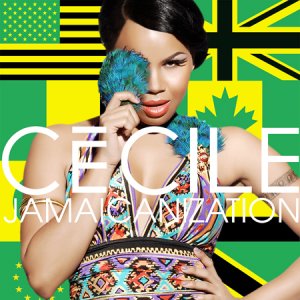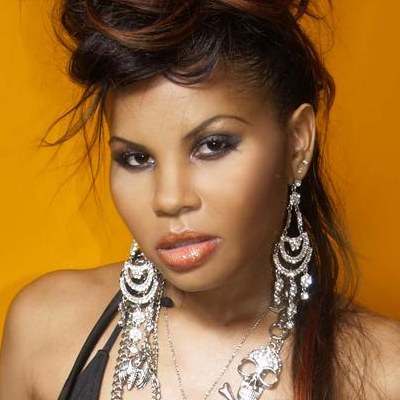When Ce’Cile Charlton arrived to Jamaica’s dancehall reggae scene in 2001 with her buzzworthy single “Changez,” she was instantly cast as the genre’s latest bad gyal – a term which has since become her alter ego.
Her tune, a remake of Mary J. Blige’s 1992 offering “Changes I’ve Been Going Through,” made playful references to the – ahem – sexual prowess of the industry’s biggest male stars. Indeed, it wasn’t long before mixtapes featuring a slew of response songs by the likes of Beenie Man and Elephant Man hit the streets and radio stations worldwide.
 For Ce’Cile, while the instant bout with fame was clearly welcome – she was also carefully plotting her next move when I interviewed her in 2002. Perhaps that isn’t too surprising for someone whose grandfather was formerly the mayor of Mandeville, a gorgeous city in south Jamaica that served as the birthplace of the legendary reggae musician Jacob Miller and rapper Heavy D. And the actress Sheryl Lee Ralph was raised there.
For Ce’Cile, while the instant bout with fame was clearly welcome – she was also carefully plotting her next move when I interviewed her in 2002. Perhaps that isn’t too surprising for someone whose grandfather was formerly the mayor of Mandeville, a gorgeous city in south Jamaica that served as the birthplace of the legendary reggae musician Jacob Miller and rapper Heavy D. And the actress Sheryl Lee Ralph was raised there.
But even as a newly-minted star, Ce’Cile astutely realized a decade ago that longevity wasn’t guaranteed, particularly in an industry in which scores of overnight sensations are now best remembered as one-hit wonders.
Yet in the years since “Changez,” Ce’Cile has blended a knack for songwriting and her own considerable vocal skills with a bold splash of sex appeal to carve out her own platform.
No easy feat for an independent artist who, at times, has had to contend with unscrupulous concert promoters, record label shenanigans, and visa hurdles in some countries including, most notably, the U.S.
Still, after collaborating with a bevvy of notable dancehall heavyweights, including Sean Paul (“Can You Do The Work?”) and Lady Saw (“Loser”), Ce’Cile regularly tours Europe and now has three albums in her portfolio and a solid stream of sweat-’til-you’re drenched singles (like the 2016 cut “Wanna Ride,” which features fellow dancehall star Kalado.)
Much of that was on the horizon at the time when Ce’Cile conducted this interview – which marked one of her first with a foreign journalist. In excerpts that are published here for the first time, Ce’Cile reflects on women in dancehall, her own journey, and the joy and challenges of performing abroad.
Well beyond performing “Changez,” you also wrote and produced it. Were you surprised as to how this song took off?
Yuh know, it was well received. Beenie [Man] and Elephant [Man] did their own songs, but everybody was just working through the media hype. Unfortunately, “Changez” isn’t one of my favorite songs anymore. After performing it so often, it’s just regular words now. I did the Caribbean Reggae Fest a few weeks ago and I didn’t do it [laughs]. But I know that if I’m going on certain shows, I’m going to have to perform it.
Your career actually began at the age of 15, which was soon followed by a major recording session with [Third World guitarist] Michael “Ibo” Cooper. How did that come about?
He was a friend of my Dad. We did a song called “Beat of My Heart.” [Ibo] used to go through my poetry book because I was a poet – well, I still am. I’m hoping to release a book of poetry. Anyway, he went through my book and liked that song and another poem I had called “Fifty-Four.” But prior to that, I had been in the studio with another friend of my Dad and I was just getting the vibe and everything. I was also a manager at Celestial Sounds [studio], which was my way of getting into the music business – learning the ins and outs of songwriting and studio production, meeting people, and putting myself in a position where I could do dancehall – even though I was never an authentic dancehall person.
 We’ve seen the peaks and valleys of dancehall being embraced internationally. Right now, as you know, dancehall is experiencing a major rejuvenation in the U.S. through the success of Sean Paul and others. What is your view of the industry’s state given that you’re now a part of it?
We’ve seen the peaks and valleys of dancehall being embraced internationally. Right now, as you know, dancehall is experiencing a major rejuvenation in the U.S. through the success of Sean Paul and others. What is your view of the industry’s state given that you’re now a part of it?
Our motto in Jamaica is “Out of many, one people.” We’re very diverse in the way we speak, the way we act, the way we look, and our talents as well. So it’s good that every side of our culture is being shown to the mainstream. We’re carrying flags for our country. Sean Paul and Elephant Man are two very different artists, but they’re both Jamaican. I’m a very different artist from Lady Saw, but we’re both Jamaican. People shouldn’t have to choose between us. We just need more females coming up along with the males.
Some critics argue that dancehall is in danger of losing its authentic sound. Do you share those concerns?
Nah, music is music as far as I am concerned. However, when we do a dancehall track or a dancehall album, I don’t understand why some people call it R&B or rap. I can understand that maybe we don’t have a lot of contenders in that genre so they have to consider it rap, but I’m hoping that we can straight up say it’s dancehall.
What do you think can be done to increase the number of female artists in dancehall?
Well, there are definitely more women coming up. For the most part, I was an advocate. For years, I was suggesting to producers that they should be recording more females. I’ve even seen a few females coming up now who have been making remarks about me. I don’t care if they’re counteracting my songs. If that helps their career, fine. Right now – except for me, Lady Saw and Tanya Stephens, I don’t see any contenders. But they will come.
You told me that you don’t consider yourself a dancehall artist. Have you ever felt pressure to conform to a certain standard?
Nah, I said that I don’t consider myself authentic to dancehall. Singing is what I love to do. When I was coming up, I would meet some producers who were only interested in sex – so I had to learn how to do things for myself. I didn’t wait for anybody. If you look a certain way, you have to work twice as hard. I know that. Look at Sean Paul. Even now, there are people in Jamaica who don’t want to admit that his flow is wicked. They’re like ‘It’s his color.’ If he didn’t have the talent, I don’t think he would have gone where he has. I’m my own person and that’s what I have to stay true to. I know that I’d love to get to a level where I don’t have to be overtly sexual and can sing about some profound stuff.
Jamaican patois is quite distinct, to say the least. In fact, some have argued that it’s a language in itself. Overall, do you think it’s been challenging for audiences in America, for example, to grasp what dancehall artists are expressing in the music?
I know there have been times when I’ve performed for people who don’t understand some of the things I’m saying, but they like the beat. The dancehall beat is very infectious. It has something in there that yuh just move to. Soca is the same way too. I can speak in English and I speak in patois. Look at the this – I was in South Beach the other day and there were some Jamaican performers there and the majority of the audience was American. But one of the reasons the audience wasn’t enjoying this band as much was because they couldn’t understand them. It was really a show for a Caribbean audience. But sometimes, when you’re performing in front of an American or European audience, you have to say things that they can relate to.
If singing is what you really love to do – is that the direction where you’d like to take your career?
I’m a musician, a poet, a writer – whatever [laughs]. I’m a singer turned DJ. I really taught myself how to DJ when I did “Changez.” That was the first time I ever DJ’d in my life. I took different styles from [musicians] Mr. Vegas, Tanya Stephens, and Diana King. I put everything that they did and put it all together. But I know where I want to go now. I think I’m slowly getting my own style where people can hear something that I did and say ‘Yep, that’s Ce’Cile.’


Add Comment